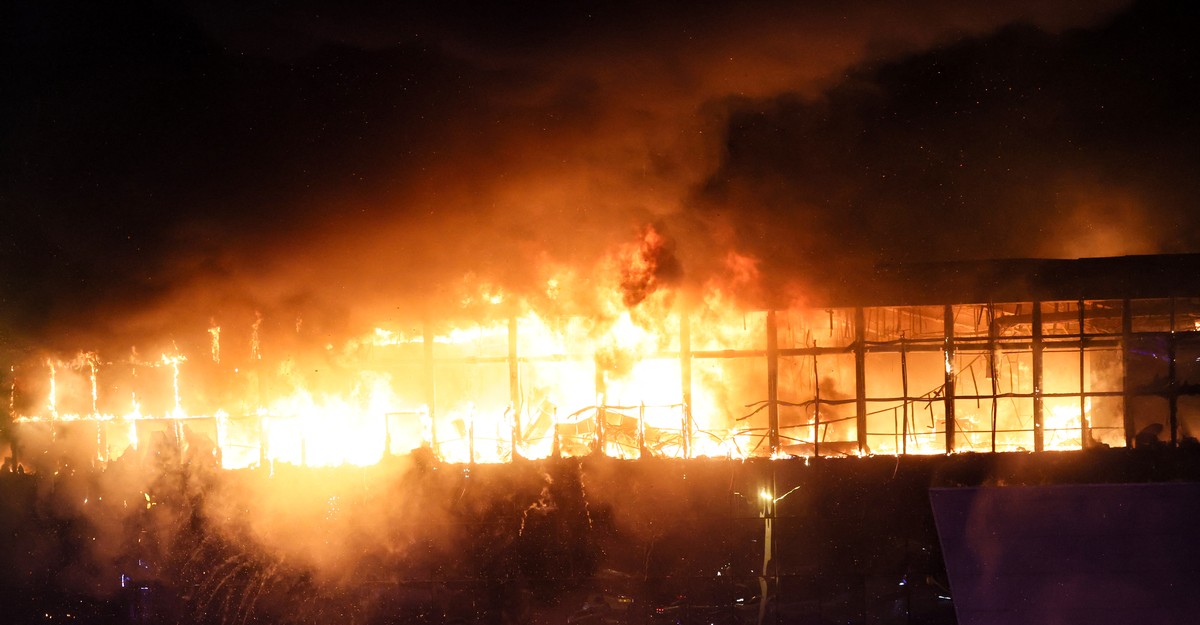Conspiracy Theories About the Moscow Attack Are Unnecessary

Updated at 2:05 p.m. ET on March 23, 2024
A decade ago, when foreign fighters were flowing into Syria, the Islamic State’s capital, Raqqa, became a sort of Epcot of global jihad: New arrivals from different nations clustered together in their national groups. If you were a recent arrival from France or just wanted to know where to get a croissant, you could visit a café full of French people and ask. Tens of thousands of foreign fighters came from places as distant as Chile and Japan. Russia alone contributed as many as 4,000, according to President Vladimir Putin, and by all accounts, their cluster focused not on pastry but on warfare. The only countries that put up numbers to rival Russia’s were Tunisia and Turkey.
Yesterday, terrorists murdered at least 133 concertgoers in suburban Moscow. The Islamic State’s news agency, Amaq, posted the group’s claim of responsibility, as usual in language balanced between wire-service precision and rabid derangement. The claim described an attack “against a large gathering of Christians”—an odd way to describe a nonreligious prog-rock concert. Videos from the scene show gunmen firing into piles of huddled civilians and stalking others. The style resembles the Bataclan massacre, which ISIS perpetrated in Paris in 2015, and the October 7 attack, the handiwork of ISIS’s enemy Hamas. The Amaq report says the killers “withdrew to their bases,” which suggested that they remained at large and capable of attacking again, and that they had more than one base. By Saturday, Russia claimed to have arrested all four perpetrators and several accomplices. Putin suggested the killers had been on a run for the Ukrainian border.
In Russia, as in many authoritarian states, rumors proliferate fast after shocking events like this. Many repeated the crazy theory that ISIS was deliberately invented by America. The exiled chess master and dissident Garry Kasparov suggested that Russia had attacked itself to drum up ethnonationalist sentiment. Putin’s intimation of Ukrainian involvement makes little sense to me. It beggars belief that the most hunted men in Russia would immediately drive in a white Renault toward the most heavily militarized and monitored zone in the entire region when they could drive in any other direction and be alone in a birch forest somewhere. But Putin’s version is consistent with the theory that he will use the attack to demonize Ukraine.
Everything we know about Russia and its history with ISIS supports the theory that ISIS perpetrated the attack. ISIS has been reviving its capacity, particularly in its Khorasan affiliate, the one identified by U.S. intelligence as responsible for the attack. Islamic State Khorasan Province “has taken on a more central role in planning attacks abroad,” Tore Hamming, a jihadism researcher at the risk-management consultancy Refslund Analytics, told me by text. He said a number of recent events, such as the arrests of suspected members in Turkey, suggest that the group is planning attacks outside its usual area of operations.
ISIS had a huge Russian and Central Asian contingent in its heyday. And the fault lines in Russian politics and society have foretold this kind of atrocity for literally centuries. It would be a surprise if four guys piled into a car and sped toward Ukraine after committing mass murder. Nothing could be less surprising than an ISIS attack in a region susceptible to just such an attack.
About one out of every five Russian citizens is Muslim, but that population is not evenly distributed either geographically or socioeconomically. In cities, a lot of taxi drivers and hard-luck laborers have names like Magomedov and Ismailov, indicative of Muslim ancestry. Many have roots in majority-Muslim Central Asian countries and have come to Russia in search of jobs. A very large proportion of the ISIS fighters from those countries came through Russia and developed violent tendencies there, away from the moderating influence of friends and family. The four alleged perpetrators arrested by Russia are reportedly from Tajikistan, a Central Asian republic bordering Afghanistan.
The center of geographic gravity of Islam in Russia is the Northern Caucasus, the site of domestic strife and bloodshed in a series of episodes going back centuries. In lieu of perfecting croissants, some groups around Dagestan and Chechnya have become proficient guerrilla warriors, and Putin perfected his own harsh methods on them during the Chechen Wars of the 1990s and 2000s. Those wars ended with a decisive Russian victory and the installation of micro-Putins, such as Ramzan Kadyrov, so that Moscow could rule Chechnya indirectly. These figures’ loyalty is such that two years ago, in the early days after the invasion of Ukraine, Kadyrov’s Chechen fighters were among the first deployed to fight on Putin’s side.
The problem is that decisive victories are never as decisive as they seem. Most residents of formerly restive regions in the Caucasus enjoy peace as much as anyone. But discontent is easy to detect. On my last visit to Dagestan, a taxi driver sheepishly turned down his music player when a jihadist song came on. Some people remain eager to fight.
The rise of ISIS was useful for Russia, which could imagine no better destination for its domestic jihadists than a faraway conflict with a conveniently high mortality rate. Anyone so inclined could go to Iraq or Syria with Moscow’s tacit blessing. That is one reason the number of ISIS members coming from Russia was so high: They were more or less permitted to go, so that they would self-detonate or run into machine-gun fire there, rather than make trouble within Russia’s borders. Many of those who went are now dead, as hoped. Some are not, and many of those have not lost their fervor. They just need a new object for it.
The connection between Russia and ISIS is, in other words, overdetermined. The cruelty of the killing and even the choice of venue—a concert hall—are all awfully familiar to anyone acquainted with jihadism in Russia. What comes next will be familiar too. The horrific videos and claims of responsibility have already arrived. Next will be a brutal reply from the Russian state. Whether that reply will be addressed to the attack’s actual authors is an open question.


